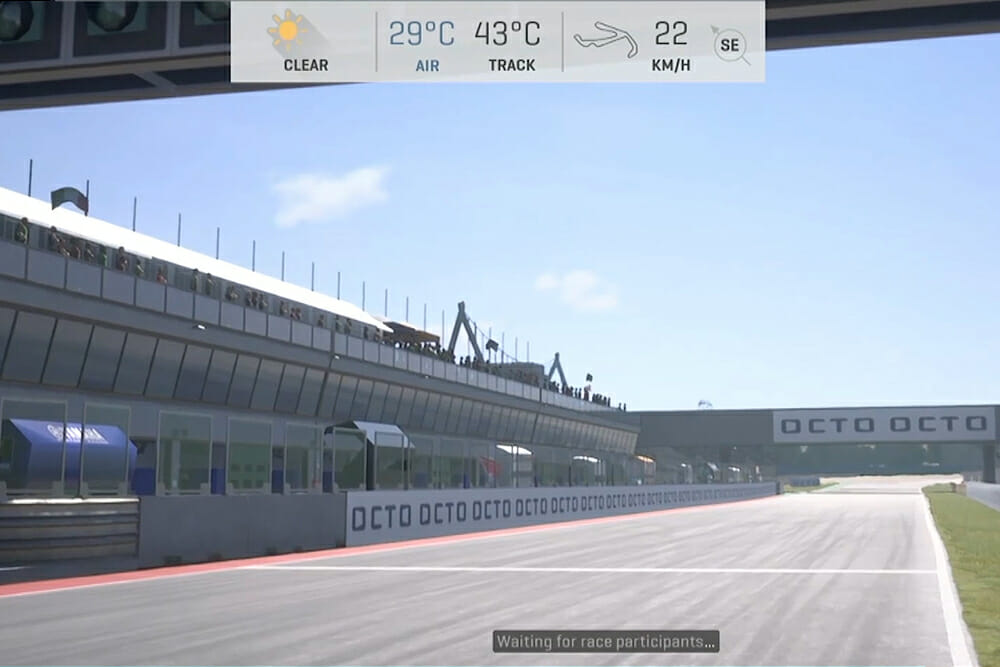Michael Scott | May 20, 2020
Cycle News In The Paddock
COLUMN
When Nothing Is Better Than Nothing
“Well,” said the millennial I was talking to. “It’s better than nothing.”
No, I replied. It’s worse.
We were discussing that reliable topic for dissent between curmudgeons like me and everyone else in the world: virtual reality versus real life. In particular, Dorna’s febrile attempt to keep the so-called “MotoGP family” around the table by staging virtual grand prix events at virtual tracks—Jerez, a couple of real weekends ago, and now another one at Misano. Just to include another layer of dullness, this latest exercise in trivialization adds MotoE to the three classes.

Even under lockdown, it should be possible to find something more interesting to do. Both the participants, at home on their sofas, as well as race fans.
NASCAR, my “better-than-nothing” correspondent said, had also been engaged in lockdown virtualizing; likewise, with real drivers piloting avatars of themselves and their cars… and in one race, one of the drivers had thrown a hissy fit and stormed off.
Whereupon his sponsors withdrew their support!
What?
When virtual nonsense takes a controlling hand in the real world, something has gone badly wrong.
Is it just me that thinks so?
Am I out of step with the rest of the racing world?
Again!
Happily, MotoGP’s stay-home play-play not-racing has yielded no such consequences. Yet. Nobody’s been sacked, drug-tested or otherwise inconvenienced.
We’ve had a couple of highly unlikely winners in the warm-up rounds (Alex Marquez, I seem to recall, first time, and then Pecco Bagnaia (and now Alex Marquez again), but I might be wrong, because I really wasn’t paying too much attention. It might have been Mike Hailwood who won. Or possibly Elvis Presley.
Then the “proper” three-class extravaganza at not-Jerez, and this time Vinales was victorious.
My respect for Rossi soared when I heard he had declined to take part, ceding his factory Yamaha slot to Maverick. Rossi is clearly a man who understands the true values of life. And of racing.
Then he went and spoiled it all by signing up for the next one at not-Misano.
Perhaps I need to question my disdain. Is play-play-station grand prix racing really so odious, or is the smell coming off me?
You have to ask: what is the value of racing? Or start at the other end. What is the value of virtual racing?
It’s to get around a made-up track with algorithm-controlled adhesion and so on faster than anyone else, without hurting your thumb on the controller.
Real racing is not that different: it’s to get around a real but originally made-up track faster than anyone else. At worst, or even in essence, it’s juvenile “I-can-pee-further-than-you-can” stuff. That’s at worst.
The difference, and it is of crucial importance, has to do with hurting your thumb. Real racing involves real risk.
Spectacular crashes are common in not-racing, then you just stand up and jog over to restart your miraculously undamaged bike.
Hmmm.
Perhaps it would be fairer if qualified medical staff were standing behind the participants, ready to administer appropriate injuries. Bruises and gravel-rash most of the time, but another random algorithm could determine when and whether a hammer blow to the knee, a scaphoid-crushing wrench to the wrist and elbow, or a shattered collarbone might punish a low-side, while a block-and-tackle lift-and-drop can go some way toward simulating a high-side.
Virtual stewards could examine the sporting legalities and apply penalties and suspensions, and there’d need to be some virtual bike damage as well.
But it’s not injuries that add value to racing. Getting randomly hurt is a downside, not an intrinsic part of the fun.
So, if it’s not the danger, then it must be the athletic skill, lightning reflexes that makes racing worthwhile. It’s not that hard to ride a motorcycle, but it takes years of practice and special hand-eye-bottom coordination to take a very powerful one to its outer limits.
Okay, but there are skills also in play-play-station racing. Just different ones. That doesn’t necessarily make them less enviable or admirable. Just, compared with real racing, less interesting.
But these are real racing heroes doing this not-racing. Should that not be interesting in itself?
Sorry, but no. They have earned our respect for riding motorcycles, and in some cases for being amusing. But their main strength is not as personalities. Nor electronic thumb-jockeys.
Back to the technical. Racing is interesting because motorbikes are interesting. There is also the potential of valuable advances in the science of internal-combustion engines.
But if there is one single factor that turns these virtual GPs into a distasteful, trivializing and demeaning mockery of the sport, it is to do with courage. That is what ennobles bike racing. And the lack of this requirement is what turns virtual MotoGP into a mockery. CN
Click here for all the latest MotoGP news.